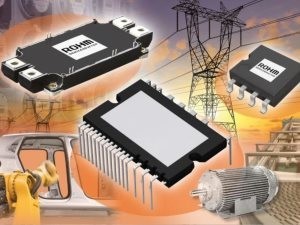
The energy system in Europe is undergoing a historic transition. The switch to sustainable generation is bringing about increasing decentralization with huge ramifications for the entire value chain. Smart energy is the umbrella term for a wide range of technologies in this area relating to energy storage, consumption control, and energy conversion. electronica 2018 will take place between November 13 and 16 in Munich under the motto “Connecting everything—smart, safe & secure” and will be showcasing products and services from a wide range of sectors, all with some connection to this broad topic. The “Power Electronics Forum” will focus on the power electronics, smart grid, and energy storage segments.
Power supply from a small number of large, centrally connected power plants will soon be a thing of the past. More and more customers are becoming “prosumers”, i.e. consuming and producing electricity at the same time. Many small power plants are also obtaining energy from renewable resources. This increasingly fragmented, bidirectional, and volatile supply structure urgently requires an intelligent load and generation management system—in other words, a smart grid.
Some individual components of this, such as smart meters, are already in use today; these can be used by points of consumption to communicate with the smart grid. Energy suppliers and municipal utilities also see an opportunity here to open up new areas of business. Since 2017, German law has also required the installation of intelligent measurement systems for end users whose consumption exceeds 6000 kWh per year and for operators of co-generation plants and renewables-based plants with over seven kilowatts per year.
Analysts from Grand View Research expect there to be 285 million smart meters in households, offices, and factories around the world by 2025. This will generate turnover of 50 billion US dollars, with coverage somewhere in excess of 50 percent according to Navigant Research.
But electricity meters are just one component of the smart energy concept. Smart-home and smart-city technologies also cover a whole range of sub-areas. That’s why you will find the topic of “intelligent energy” covered in many segments at electronica 2018. These includes wireless and embedded as well as the Internet of Things and autonomous systems. Even electric vehicles have a role to play as flexible storage systems and grid stabilizers.
The Power Electronics Forum
The first ever Power Electronics Forum will specifically cater to the subject of smart energy. The forum will cover the whole spectrum of power supply units, power stores and power electronics, the last of which is among the key technologies for climate-friendly, resource-saving, yet competitive energy supply. This is because innovative power electronics technology minimizes losses through the conversion, distribution, and consumption of electrical energy. For many applications, silicon is no longer the first choice here. Wide-bandgap semiconductors such as silicon carbide (SiC) and gallium nitride (GaN) deliver higher switching capacity and breakdown voltages in a high temperature range.
Passive components such as heat sinks, capacitors, and coils can therefore be smaller in size, which has a positive impact on the form factor of the overall system.
This makes them important components for the smart grids of the future. In these intelligent power grids, decentralized distributed intelligence controls the generation, storage, and consumption of energy. As such, the performance fluctuations caused by fluctuating renewable energies must be compensated for. However, smart grids not only transport energy but also data from smart meters, sensors, and other devices. This is another industry segment where the Internet of Things can be found—in fact, electrical grids are even set to become the largest IoT installations of all. This process involves the networking of various components using modern information and communication technology. The topic is dealt with in detail in electronica’s Wireless Congress.
Smart Energy—the exhibition
The Power Supplies exhibition area in halls A5 and A6 covers the full spectrum of transformers, power supplies, power supply units, and batteries. But that’s not the only place where you will find smart energy components.
Rohm (hall C3, stand 512), a leading provider of power semiconductors, will be covering the entire production process from SiC wafers to components right through to packaging.
BLOCK Transformatoren will be demonstrating throttles for high switching frequencies in the area of SiC and GaN applications.
Tesla Blatna, a.s. (hall A6, stand 113) develops sensors based on IQRF wireless technology for smart-city projects.
The fast charging stations from Delta Electronics (hall A5, stand 238) can also be supplied on site using renewable energy sources and thereby improve the storage capacity for the entire energy grid.
Excelsys Technologies Ltd. (hall A5, stand 418) produces high-quality power supply units with the latest technologies and modern management processes.
Uninterruptible power supplies (UPS) with ultra-capacitors made from graphene from Skeleton Technologies (hall A5, stand 201) deliver short-term power in the megawatt range to bridge any power outages in the business.